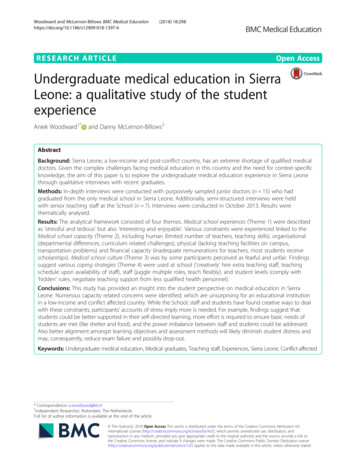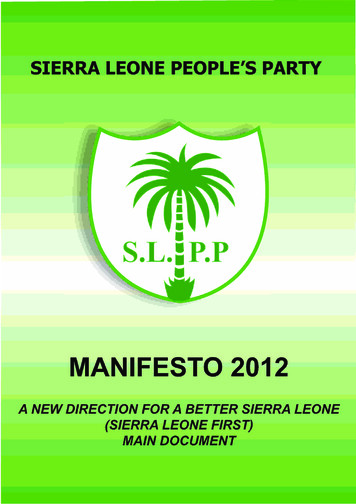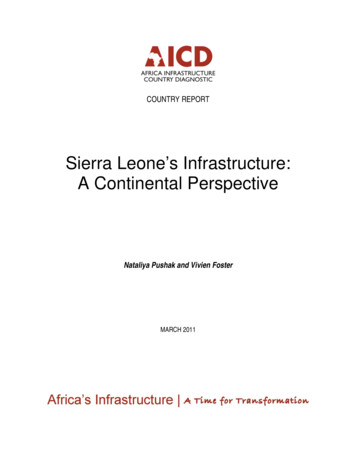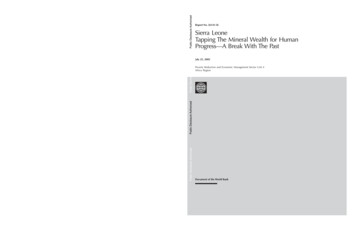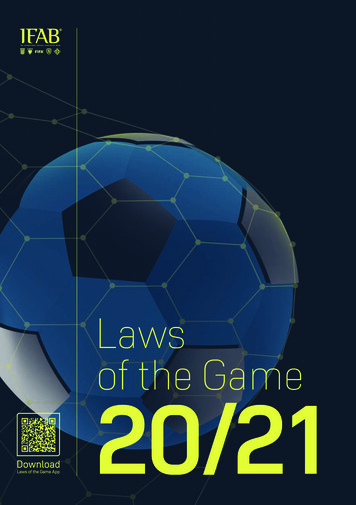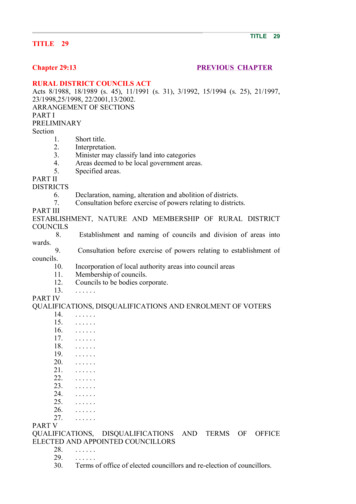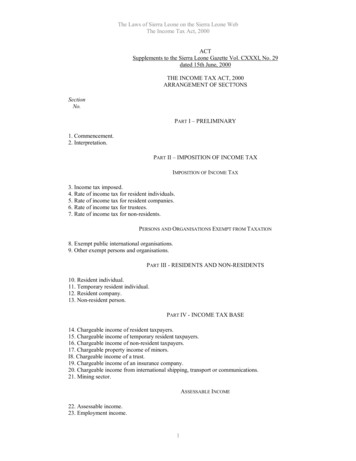
Transcription
The Laws of Sierra Leone on the Sierra Leone WebThe Income Tax Act, 2000ACTSupplements to the Sierra Leone Gazette Vol. CXXXI, No. 29dated 15th June, 2000THE INCOME TAX ACT, 2000ARRANGEMENT OF SECT7ONSSectionNo.PART I – PRELIMINARY1. Commencement.2. Interpretation.PART II – IMPOSITION OF INCOME TAXIMPOSITION OF INCOME TAX3. Income tax imposed.4. Rate of income tax for resident individuals.5. Rate of income tax for resident companies.6. Rate of income tax for trustees.7. Rate of income tax for non-residents.PERSONS AND ORGANISATIONS EXEMPT FROM TAXATION8. Exempt public international organisations.9. Other exempt persons and organisations.PART III - RESIDENTS AND NON-RESIDENTS10. Resident individual.11. Temporary resident individual.12. Resident company.13. Non-resident person.PART IV - INCOME TAX BASE14. Chargeable income of resident taxpayers.15. Chargeable income of temporary resident taxpayers.16. Chargeable income of non-resident taxpayers.17. Chargeable property income of minors.I8. Chargeable income of a trust.19. Chargeable income of an insurance company.20. Chargeable income from international shipping, transport or communications.21. Mining sector.ASSESSABLE INCOME22. Assessable income.23. Employment income.1
The Laws of Sierra Leone on the Sierra Leone WebThe Income Tax Act, 200024. Business income.25. Property income.EXEMPT INCOME26. Diplomatic and similar income.27. Income of exempt organisations.28. Scholarships.29. Maintenance and child support.30. Proceeds of life insurance policy.31. Other exempt income.DEDUCTIONS32. Expenses of deriving income.33. Expenses incurred to derive rental income from real property.34. Meal, refreshment and entertainment expenses.35. Interest expenses.36. Bad and doubtful claims.37. Research and development costs.38. Expenses in respect of pension and annuity payments.39. Capital allowance deduction for depreciable assets.40. Investment allowance.41. Repairs and improvements.42. Mineral and petroleum extraction.43. Start-up costs.44. Business investment relief.TAX ACCOUNTING PRINCIPLES45. Year of assessment.46. Ordinary and substituted year of assessment.47. Transitional year of assessment.48. Method of accounting.49. Cash-basis accounting.50. Accrual-basis accounting.51. Claim of right.52. Prepayments.53. Long-term contracts.54. Trading stock.55. Debt obligations with discount or premium.56. Foreign currency debt gains and losses.GAINS AND LOSSES ON DISPOSAL OF ASSETS57. Gains and losses on disposal of assets.58. Cost base of assets.59. Consideration received.60. Losses on disposal of investment assets.61. Non-recognition of gain or loss.MISCELLANEOUS PRINCIPLES FOR DETERMINING CHARGEABLE INCOME2
The Laws of Sierra Leone on the Sierra Leone WebThe Income Tax Act, 200062. Income of joint owners.63. Valuation.64. Currency conversion.65. Indirect payments and benefits.66. Compensation receipts.67. Recouped deductions.PART V - ALTERNATIVE CHARGEABLE BUSINESS INCOME ANDDESIGNATED CHARGEABLE INCOME68. Ordinary chargeable business income.69. Alternative chargeable business income.70. Designated chargeable income.PART VI - SPECIAL PPINCIPLES FOR INDIVIDUALS71. Individual as tax unit.72. Income splitting.PART VII - SPECIAL PRINCIPLES FOR PARTNERSHIPS73. Principles of taxation of partnerships.74. Calculation of partnership income or loss.75. Taxation of partners.76. Disposals of property to and by a partnership.77. Cost base of partner's interest.PART VII - SPECIAL PRINCIPLES FOR TRUSTS78. Definition of terms.79.- Principles of taxation for trusts.80. Taxation of beneficiaries.81. Taxation of trustees.82. Taxation of settlors.83. Taxation of estates of deceased persons.PART IX - SPECIAL PRINCIPLES FOR COMPANIES84. Principles of taxation for companies.85. Deemed dividends.86. Share cancellations, redemptions and acquisitions.87. Incorporation roll-over.88. Change in control of companies.PART X - INTERNATIONAL TAXATION89. Source of income.90. Allowable foreign tax credit91. Foreign employment income of residents.92. Agents for non-residents.93. Taxation of branch profits.3
The Laws of Sierra Leone on the Sierra Leone WebThe Income Tax Act, 200094. International agreements.PART XI - ANTI-AVOIDANCE95. Transfer pricing.96. Recharacterisation of income and deductions.PART XII – RETURNS97. Filing of return of income.98. Cases where return is not required.99. Information returns.100. Extension of time to file returns.PART XIII – ASSESSMENTS101. Ordinary, deemed and special assessments.102. Jeopardy assessments.103. Amended assessments.104. Provisional assessments.PART XIV - COLLECTION AND REFUND OF TAXDUE DATE FOR PAYMENT105. Due date for payment of income tax.RECOVERY OF TAX106. Income tax as a debt due to Sierra Leone.107. Tax lien.108. Recovery from agent of non-resident.109. Distress Proceedings.110. Recovery of tax from person owing money to the taxpayer.111. Duties of receivers.112. Remission of irrecoverable tax.INSTALMENTS OF INCOME TAX113. Instalments of income tax.PREPAYMENT OF INCOME TAX BASED ON CIF PRICE OF IMPORTS114. Prepayment of income tax.REFUNDS OF TAX115. Repayment of overpaid tax.PART XV - WITHHOLDING OF TAX AT SOURCE4
The Laws of Sierra Leone on the Sierra Leone WebThe Income Tax Act, 2000WITHHOLDING OBLIGATIONS116. Withholding of tax by employers.117. Payments to contractors.118. Payments of dividends.119. Payments of interest.120. Payments of rents and royalties.121. Payments of pensions and annuities.122. Natural resource payments.123. Payments to non-resident beneficiaries of trusts.124. Final withholding tax on dividend and interest payments to residents.125. Final withholding tax on payments to non-residents.GENERAL PROVISIONS RELATING TO WITHHOLDING OF TAX AT SOURCE126. Definition of terms.127. Tax withholding certificates.128. Record of payments and tax withheld.129. Failure to withhold tax.130. Payment of tax withheld.131. Priority of tax withheld.132. Adjustment on assessment and withholder's indemnity.PART XIV - RECORDS AND INVESTIGATION POWERS133. Accounts and records.134. Access to books, records and computers.135. Notice to obtain information or evidence.136. Books and records not in the English language.PART XVII - OBJECTIONS AND APPEALSOBJECTIONS137. Objection to assessment.INCOME TAX BOARD OF APPELLATE COMMISSIONERS138. Board of Appellate Commissioners.139. Secretary to Board.140. Board to hear appeals.141. Procedure of Board.142. Hearings and decisions.APPEALS143. Appeal to Board.144. Appeal to High Court.145. Onus on taxpayer.PART XVIII - INTEREST AND PENALTIES5
The Laws of Sierra Leone on the Sierra Leone WebThe Income Tax Act, 2000INTEREST146. Specified rate of interest.147. Interest on tax not paid when due.148. Interest on overpayment of tax.PENALTIES149. Recovery of penalty.150. Penalty for failure to file correct return.151. Penalty for underestimation of tax payable.152. Penalty in relation to tax withheld under Part XV.OFFENCES153. Transfer to Director of Public Prosecution.154. Tax evasion.155. Impeding tax administration.156. Failure to preserve secrecy.157. Contempt of Board.158. Making false or misleading statements.159. Failure to maintain proper records.160. Failure to comply with notice.161. Aiding or abetting.162. Offences by tax officials.PART XIX - ADMINISTRATIONOFFICE OF THE COMMISSIONER OF INCOME TAX163. Appointment of Commissioner of Income Tax, Deputy Commissioners and other officers.164. Delegation.SECRECY165. Secrecy.REGULATIONS, PUBLIC GUIDELINES AND RULINGS166. Regulations.167. Commissioner to issue public guidelines.168. Private rulings.169. Non-binding statements.FORMS AND NOTICES170. Forms and notices.171. Service and sufficiency of notices and other documents.NOMINATED OFFICERS6
The Laws of Sierra Leone on the Sierra Leone WebThe Income Tax Act, 2000172. Notification of nominated officers.TAXPAYER FILE NUMBER AND TAX CLEARANCE CERTIFICATE173. Taxpayer file number.174. Tax clearance certificate.PART XX - REPEALS AND TRANSITIONAL PROVISIONS175. Repeal.176. Transitional provisions.SCHEDULESFIRST SCHEDULE – Rates of tax in respect of residentsSECOND SCHEDULE – Rates of tax in respect of non-residentsTHIRD SCHEDULE – Complying retirement fundsFOURTH SCHEDULE – Chargeable income of company carrying on insurance businessFIFTH SCHEDULE – International shipping, transport and communicationsSIXTH SCHEDULE – Mining sectorSEVENTH SCHEDULE – Capital allowance deductionEIGHTH SCHEDULE – Income Tax Board of Appellate CommissionersNINTH SCHEDULE - Miscellaneous provisionsTENTH SCHEDULE – Form of warrantSIGNED this 31st day of May, 2000ALHAJI AHMAD TEJAN KABBAH,President.No. 82000The Income Tax Act, 2000Being an Act to consolidate, with amendments, the law relating to the taxation of incomes.7
The Laws of Sierra Leone on the Sierra Leone WebThe Income Tax Act, 2000[15 June, 2000]ENACTED by the President and Members of Parliament in this present Parliament assembled.PART I – PRELIMINARYCommencement.1. This Act shall be deemed to have come into operation on the 1st April, 2000.Interpretation.2. In this Act, unless the context otherwise requires—“adjusted cost base” means the cost base of an asset increased by—a)indirect expenses, including commissions and legal fees incurred in respect of the acquisition,production or construction of an asset;b) interest and taxes incurred during the acquisition, production and construction period of an asset;c) customs duties incurred in respect of the importation of an asset; ord) the cost of improvements and other costs properly added to capital accounts in respect of the asset(other than an amount allowed as a deduction);“assessment” includes an amended assessment, a deemed assessment, a provisional assessment and a specialassessment;“associate” in relation to a person means any other person who is not at arms-length with the person or whoacts or is likely to act in accordance with the directions, requests, suggestions or wishes of the personwhether or not the directions, requests, suggestions or wishes are communicated to that other person;“bad debt” means a debt in respect of which the taxpayer has taken all reasonable steps to the satisfaction ofthe Commissioner to pursue payment and which the taxpayer reasonably believes will not be satisfied;“branch” means a place where a person carries on business and includes—a)a place where a person is carrying on business through an agent, other than a general agent ofindependent status acting in the ordinary course of business as such;b) a place where a person has, is using or is installing substantial equipment or substantial machinery;orc) a place where a person is engaged in a construction, assembly or installation project for a period ofmore than six months;“business” includes a trade, profession, vocation and an isolated transaction with a business character, butdoes not include employment;“business asset” means an asset held for the production of assessable income and which is used in a businessor is held for sale in a business;“chargeable business income” in respect of a taxpayer means the taxpayer’s assessable business income lessany allowable deductions for expenses incurred to derive that income;“Commissioner” means the Commissioner of Income tax and, except for the purpose of section 153,includes a Deputy Commissioner or an Assistant Commissioner;“company” means a body corporate or unincorporate, whether created or recognised by or under any law in8
The Laws of Sierra Leone on the Sierra Leone WebThe Income Tax Act, 2000force in Sierra Leone or otherwise, and includes a superannuation fund, a friendly society and a providentfund but does not include a partnership or trust;“complying retirement fund” means a retirement fund that has received notification from the Commissionerthat it complies with the requirements of the Third Schedule;“debt claim" means a right to receive payment or repayment of money or property from another personand includes deposits in banks and other financial institutions, accounts receivable, notes, bills of exchangeand bonds;“debt obligation" means the obligation to make payment or repayment of money or property to anotherperson and includes the things falling under a debt claim;“depreciable asset" means tangible or intangible property which is wholly or partly used in the production ofassessable income and which is likely to lose value because of wear and tear, obsolescence or the passage oftime;"disposal” in relation to an asset, means—a) the sale, exchange. redemption or distribution of the asset;b) the transfer of the asset as a gift or at death; orc) the destruction, loss or extinction of the asset,and includes the disposal of a part of the asset;“dividend” means a distribution by a company to a shareholder in the company as shareholder and includesany distribution upon redemption or cancellation of a share or in the course of liquidation, other than adistribution described in subsection (2) of section 86;"employee'' means an individual who receives employment income and includes any individual engaged forshort-term or part-time work other than an individual acting as an agent;“employer” means a person who employs or remunerates an employee;“employment" means—a) the position of an individual in the employ of another person;b) a directorship of a company;c) a position entitling the holder to a fixed or ascertainable remuneration and includes a public office;“interest " includes—a) an amount paid or accrued under a debt obligation which is not a return of principal; andb) any gain realised. by way of a discount, premium, swap payment or similar payment on a loan;“investment asset" m an asset other than—a) a business asset, orb) an asset that does not produce assessable income and that is held primarily for personal use by the9
The Laws of Sierra Leone on the Sierra Leone WebThe Income Tax Act, 2000taxpayer;“market value" means the price which an asset or service might reasonably be expected to command on theopen market;"minor" means an individual who is under eighteen of age at the end of the year of assessment;“natural resource payment means—a)a rent, toll, royalty or other like payment payable under a lease or agreement which relates whollyor in part to the mining and working of minerals or a living or non-living resource of the land; orb) a payment calculated in whole or in part by reference to the quantity or value of minerals or livingor non-living resource taken from the land;"paid" includes credited;“payment” includes an amount payable, the transfer of property and any other means of conferring value orbenefit on a person;"person” includes a partnership, a company, a government, a political subdivision of a government and apublic international organisation;"rent” includes—a) any premium paid in connection with a lease or rental agreement; andb) any payment made in connection with or for the use of or the right to use industrial, commercial orscientific equipment;“retirement fund" means a pension, provident or superannuation fund or society;“royalty” means a payment for—a)the use of or the right to use a copyright, patent, design, model, plan, secret formula or process,trademark or other intangible property or right;b) the supply of know-how;c) the use of or the right to use a cinematographic film, video tape, sound recording or any likemedium;d) the supply of assistance ancillary to a matter referred to in paragraphs (a) to (c); ore) a total or partial forbearance with respect to a matter referred to in paragraphs (a) to (d);“shareholder” in relation to a company, includes a holder of an equity interest in the company.“substituted year of assessment” means the year of assessment used by a taxpayer pursuant to subsection(2) of section 46;“tax-free threshold” means the amount of income to which a nil rate of tax is applied in Parts I.II and III ofthe First Schedule;“taxpayer" means a person who is subject to tax imposed this Act or who derives income assessable underthis Act;10
The Laws of Sierra Leone on the Sierra Leone WebThe Income Tax Act, 2000“trading stock” includes goods sold or intended to be sold by a taxpayer in the ordinary course of business,work in progress on such goods and inventories of materials to be incorporated into such goods;"trust” includes the estate of a deceased person but does not include a grantor trust or qualified beneficiarytrust referred to in section 78;“trustee” includes—a)b)c)d)e)an executor, administrator, tutor or curator;a liquidator or judicial manager;a person having or taking on the administration or control of property subject to a trust;a person acting in a fiduciary capacity; anda person having the possession, control or management of the property of a person under a legaldisability;“turnover” in respect of a year of assessment means the value of the total gross receipts or amountsreceivable in money or money’s worth which give rise to business income for the year of assessment—a)reduced by that part of the gross receipts for the year of assessment or a previous year ofassessment that are bad debt claims; andb) increased by any amounts recovered in respect of bad debt claims that arose in previous years ofassessment;“underlying ownership or control” in relation to a company means ownership interests held or controlexercised directly or indirectly through interposed entities;“whole-time service director” means a director of a company who is required to devote substantially thewhole of his or her time to the service of the company in a managerial or technical capacity;“withholding agent” means a person required to withhold tax under sections 116 to 123.PART II – IMPOSITION OF INCOME TAXIMPOSITION OF INCOME TAXIncome tax imposed.3. (1) Income tax is hereby imposed on every person who has chargeable income for the year of assessment.(2) Subject to section 21, the income tax payable shall be calculated by applying the relevant rates of tax determinedby reference to the First and Second Schedules to the chargeable income for the year of assessment and subtractingany allowable tax credits.(3) Subject to sections 124 and 125, a taxpayer’s income from all sources shall be aggregated for the purpose ofapplying the relevant rates of tax in Parts I, II, III and IV of the First Schedule and the tax that will be imposed on theaggregated income without regard to any withholding tax imposed on the income or part thereof shall be reduced bythe amount of withholding tax imposed on that income.Rate of income tax forresident individuals.4. (1) Subject to subsection (2), the chargeable income of a resident individual shall be taxed at the rate or ratesprescribed in Part I of the First Schedule.(2) Subject to subsection (3), the business or property income of a person described in Part V of the First Scheduleshall be subject to the minimum tax prescribed in that Part.11
The Laws of Sierra Leone on the Sierra Leone WebThe Income Tax Act, 2000(3) Where a person described in Part V of the First Schedule derives—a)business or property income that would, apart from the application of subsection (2), be subject to taxgreater than that provided in Part V of the First Schedule, orb) additional income from any source,the Commissioner may assess tax payable by the person without regard to subsection (2).(4) The chargeable property income of a resident minor shall be taxed at the rate or rates prescribed in Part II of theFirst Schedule.(5) In the case of a resident minor whose chargeable property income is taxed at the rates prescribed in Part II of theFirst Schedule, such income shall be subtracted from chargeable income for the purposes of applying subsection (1).Rate of income tax forresident companies.5. (1) Subject to section 21, the chargeable income of a resident company shall be taxed at the rate or rates prescribedin Part III of the First Schedule.Cap. 273.(2) Resident companies incorporated before 1st April, 1997 shall continue to receive those reliefs under section 29 ofthe Income Tax Act to which they had entitlement prior to the repeal of that Act.Rate of income tax fortrustees.6. (1) Subject to subsections (2) and (3), the chargeable trust income of a trustee shall be taxed at the rate or ratesprescribed in Part III of the First Schedule.(2) The chargeable trust income of a trustee of the estate of a deceased taxpayer who at the date of death was aresident individual shall be subject to tax at the rates specified in Part I of the First Schedule for—a) the year of assessment in which death occurred; andb) the following year of assessment,on the basis of the table that would have applied to the taxpayer had the taxpayer been alive for the entire year ofassessment.(3) The chargeable trust income of a trustee of an incapacitated person's trust shall be taxed at the rates prescribed inPart I of the First Schedule as if it were the income of the incapacitated person.Rate of income tax fornon-residents.7. The chargeable income of a non-resident taxpayer shall be subject to tax at the rate prescribed in the SecondSchedule.PERSONS AND ORGANISATIONS EXEMPT FROM TAXATIONExempt publicinternationalorganisations.8. A public international organisation shall be exempt from tax if it satisfies the Commissioner that it is exemptunder international law or agreement with the Government of Sierra Leone.Other exempt personsand organisations.9. The following persons and organisations, hereinafter referred to as “exempt organisations”; am exempt fromincome tax—a)i.the City Council of Freetown and any other local authority;ii.any department or ministry of Government;iii.the Bank of Sierra Leone, andiv.any person or organisation exempted by order in a statutory instrument made by the President; andb) any organisation being—i.a religious organisation;12
The Laws of Sierra Leone on the Sierra Leone WebThe Income Tax Act, 2000ii.iii.iv.v.vi.Act. No. 6 of 1977.a charitable organisation;an amateur sporting association formed for the purpose of promoting social or sporting amenitiesnot involving the acquisition of gain by the body of persons or by its individual members;a trade union;an educational institution that offers equal access to all applicants; anda co-operating society registered under the Co-operative Societies Act 1977;none of whose income or assets confers or may confer a private benefit on any person and which has obtained awritten ruling from the Commissioner that it is an exempt organisation.PART III - RESIDENTS AND NON-RESIDENTSResident individual.10. (1) Subject to subsections (2) and (3) and to Section II, an individual shall be treated as resident in Sierra Leonefor the entire year of assessment if that individual—a)has a normal place of abode in Sierra Leone and is present in Sierra Leone at any time during the year ofassessment;b) is present in Sierra Leone on more than one hundred and eighty two days in a twelve month period thatcommences or ends during the year of assessment; orc) is an official of the Government Of Sierra Leone posted overseas during the year of assessment.(2) An individual who was not a resident in the preceding year of assessment shall not be treated m a resident for theperiod preceding the day the individual was first present in Sierra Leone during the year of assessment.(3) An individual who is not a resident in the following year of assessment shall not be treated as a resident for theperiod following the last day on which the individual was present in Sierra Leone during the year of assessment ifduring that period the individual had a closer connection to a foreign country than to Sierra Leone.(4) For the purposes of this section an individual shall not be treated as present in Sierra Leone on any day when—a)b)c)d)Temporary residentindividual.the individual crosses the border to Sierra Leone to perform services as an employee in Sierra Leone;the individual is in transit between two points outside Sierra Leone;the individual is present in Sierra Leone for the purpose of medical treatment or full-time study; orthe individual is present in Sierra Leone by of diplomatic status or being dependant of a person withdiplomatic status.11. An individual treated as resident under section 10 shall be treated as temporarily resident in Sierra Leone for theentire year of assessment if that individual –a) is not a citizen of or domiciled in Sierra Leone;b) does not intend, during the year of assessment, to reside in Sierra Leone for a total period of more than fouryears, andc) as of the end of the year, has not been resident in Sierra Leone for more than four years.Resident company.12. (1) A company is a resident company if it—a) is incorporated or formed under the laws of Sierra Leone;b) has its effective management and control in Sierra Leone; or13
The Laws of Sierra Leone on the Sierra Leone WebThe Income Tax Act, 2000c)undertakes the majority of its operations in Sierra Leone.(2) A branch in Sierra Leone of a non-resident company is deemed to be a separate person which is a residentcompany.Non-resident person.13. A non-resident person is a person who is not resident during the year of assessment or, where subsection (2) or(3) of section 10 applies, during part of the year of assessment.PART IV - INCOME TAX BASECHARGEABLE INCOMEChargeable income ofresident taxpayers.14. The chargeable income of a taxpayer resident in Sierra Leone shall be the taxpayer’s assessable income from allsources less any deduction allowed under this Act.Chargeable income oftemporary residenttaxpayers.15. The chargeable income of a taxpayer temporarily resident in Sierra Leone shall be the taxpayer’s assessableincome from all sources outside Sierra Leone which is remitted to Sierra Leone and the taxpayer's assessable incomefrom any source in Sierra Leone less any deduction allowed under this ActChargeable income ofnon-residenttaxpayers.16. The chargeable income of a non-resident taxpayer shall be—a) all payments from which tax is required to be withheld under sections 116 to 123; andb) all other assessable income from any source in Sierra Leone,less any deduction allowed under this Act.Chargeable propertyincome of minors.17. The chargeable property income of a resident minor shall be the property income included in assessable incomereduced by the allowable deductions which relate to the production of that income.Chargeable income ofa trust.18. The chargeable income of a trust shall be determined in accordance with sections 78 to 83.Chargeable income ofan insurance company.19. (1) For the purposes of this section, an insurance company is a company that carries on an insurance business inSierra Leone.(2) The chargeable income of an insurance company, other than a life insurance company, shall be determined inaccordance with paragraph 1 of the Fourth Schedule.3) A taxpayer that is a life insurance company may calculate its chargeable income on the basis of paragraph 2 or 3of the Fourth Schedule.Chargeable incomefrom internationalshipping, transport orcommunications.20. The chargeable income from a source in Sierra Leone of a non-resident person carrying on the business of—a) shipowner or charterer;b) air transport; orc) broadcasting or transmitting messages by cable, telegraph, wireless or other similar means,shall be determined in accordance with the Fifth Schedule.Mining sector.Act No. 5 of 1994.21. The chargeable income of a person derived from the exploitation of mineral rights, prospecting and explorationlicenses, mining licenses or mining leases granted under the Mines and Minerals Act, 1994 shall be determined inaccordance with and taxed at the rate prescribed in the Sixth Schedule.ASSESSABLE INCOME14
The Laws of Sierra Leone on the Sierra Leone WebThe Income Tax Act, 2000Assessable income.22. (1) The assessable income of a taxpayer for a year of assessment is the sum of –a)b)c)d)employment income;business income;property income., andany other income or gain,but does not include amounts exempt from income tax.(2) For the purposes of subsection (1), "employment income", ''business income" and “property income" each has themeaning respectively assigned thereto by sections 23, 24 and 25.Employment income.23. (1) "Employment income" means a payment or benefit arising from past. present or prospective employment,including but not restricted to the following payments or benefits—a)b)c)d)e)f)g)h)i)j)k)l)m)n)o)p)q)r)any salary, wages or other remuneration provided to the employee, including leave pay, overtime payments,commissions and bonuses;gifts received by an employee in the course of or by virtue of a past, present or future employment;unless another value is specified in subsection (2), the higher of the cost to the employer or the market valueto the employee of any benefit provided by an employer to an employee by way of the transfer or use ofproperty or the provision of services, whether or not the benefit may be converted to money's worth by theemployee;any allowance provided by the employer for the benefit of an employee or in respect of any member of theemployee's family, including any cost of living, subsistence, rent, medical, entertainment or travelallowance;any consideration provided by the employer in respect of the employees’ agreement to any conditions ofemployment or to any changes in the conditions of employment;any payment provided by the employer in respect of redundancy, any payment for loss of office ortermination of the holding of an office or employment and any similar payment;any pension payments (other than pension payments described in paragraph (d) of section 31);any payments (other than payments described in paragraph (e) of section 31) provided as a supplement to apension payment;the provision by the employer to an employee of the use, or the availability for use, of a motor vehiclewholly or partly for the private purposes of the employee;the provision by the employer of accommodation or housing;the reimbursement or disc
Resident company. 13. Non-resident person. PART IV - INCOME TAX BASE 14. Chargeable income of resident taxpayers. . Chargeable income of a trust. 19. Chargeable income of an insurance company. 20. Chargeable income from international shipping, transport or communications. 21. Mining sector. A . 148. Interest on overpayment of tax. PENALTIES .



